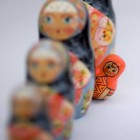۹ لغت انگلیسی با ریشه Yidish

ییدیش نامِ زبانی است که برای نزدیک به هزار سال، زبانِ مادری و گاه، تنها زبانِ یهودیانِ اشکنازی بود که در اروپای شرقی و مرکزی میزیستند. یِدیشی در میانِ فرهنگِ اشکنازی، از حدودِ سدهٔ دهمِ میلادی در کرانههای راین پا گرفت و سپس گسترده شده در مرکز و خاورِ اروپا و آمیختن اش با زبانهای اسلاوی آن را به شرقی و غربی شاخه کرد. یدیشی راستی را، از لهجههای جنوبِ شرقیِ آلمانیِ میانهٔ علیا شاخه شد و در کنارِ دیگر زبانهای آلمانی، شاخهای از زیرخانوادهٔ زبانهای ژرمنی است که با الفبای عبری نوشته میشود.
در اینجا ۹ لغت رایج در زبان انگلیسی با ریشه Yidish را بررسی می کنیم:
۱٫ Glitch
[glich]

In common usage, a glitch is a malfunction in something, often a machine or in a block of code, but this tech jargon was on the lips of European grandmothers long before sparks flew from a keyboard. Glitch is likely derived from the Yiddish glitsh meaning “a slip,” from German root glitschen. Astronaut John Glenn brought the word into popular usage in his 1962 book Into Orbit. “Another term we adopted to describe some of our problems was ‘glitch,'” Glenn writes, “literally… spike or change in voltage.”
۲٫ Maven
[mey-vuhn]

Meaning an expert or connoisseur, maven entered Yiddish via the Hebrew word mebhin meaning “one who understands.” In the early 1950s maven entered popular English usage. A 1952 article in The New York Times Magazine used an early transliteration of this Yiddish term to complain about know-it-all customers: “The most trying type of all is the ‘mayvin.'” The article then explains to readers unfamiliar with the word that this term “of Yiddish origin has entered the language.”
۳٫ Spiel
[speel, shpeel]

A spiel is a high-flown talk or speech, often given in the style of a sales pitch. The word can also be used in a verb sense, “to spiel” or to give such a speech. It is derived from the original Yiddish and German spielen meaning “to play.” The term was on the way to its current definition in 1896 when spiel meant “to speak in a glib manner.” But a 1870 source claims that at the time to spiel meant “to play circus music,” which is related to the German word singspiel which literally means “a singing play.”
۴٫ Chutzpah
[khoot-spuh, hoot-]

This spirited word came to English from Yiddish in the 1890s meaning “audacity, nerve, gall, and courage bordering on arrogance.” First transliterated as khutspe from the original Yiddish, our modern chutzpah was perhaps best defined by humorist and Yiddish lexicographer Leo Rosten as “that quality enshrined in a man who, having killed his mother and father, throws himself on the mercy of the court because he is an orphan.”
۵٫ Schmooze
[shmooz]

This worldly word was introduced to English in the early 1900s from the Yiddish shmuesn meaning “to chat.” Schmooze was used in a 1939 edition of The New Yorker discussing the social habits of New York’s fashion elite: “But schmoozing in the garment district is more than just a lot of idle chatter. Schmoozing is a careful tradition, dear to the hearts of everyone in New York’s most thickly populated business section.”
۶٫ Tchotchke
[chahch-kuh]

A tchotchke is an inexpensive souvenir, trinket, or ornament. The word entered the American vernacular in the late 1960s from the Yiddish tshatshke from similar terms in Slavic languages, including the Polish word meaning “knickknack,” czaczko. Tchotchke also meant “pretty girl,” but today this sense has largely fallen out of use in English.
۷٫ Plotz
[plots]

To plotz is to collapse or faint, as from surprise, excitement, or exhaustion. The word is derived from the Yiddish platsn meaning “to crack” or “split” from the Middle High German platzen meaning “to burst.” Plotz gained popularity in America English in the 1940s. In Patricia Welles’ 1967 book Babyhip she writes, “You’re not smoking that filthy thing in here. I’ll plotz, Mrs. Green said.”
۸٫ Schmaltz
[shmahlts, shmawlts]

If you’ve ever stared on in confusion as musicians and performers talk about their level of schmaltz, wonder no more: they’re talking about chicken fat. In the kitchen, schmaltz refers to fat or grease most commonly from a chicken and often used in soups. In Yiddish schmaltz means “melted fat,” but in the 1930s the word took on the figurative meaning of an overly sentimental or overwrought performance. A 1935 issue of Vanity Fair described it as “a derogatory term used to describe straight jazz.”
۹٫ Oy
[oi]

And finally, we give you one of the most beloved Yiddish exclamations of all, oy! or oy vey! The term combines the Yiddish shout of dismay oy, with the German term meaning “woe,” weh. Used mainly to express annoyance, oy vey! is the quintessential expression for that moment when you miss the train, spill red wine on your white table cloth, or simply can’t hear another word from your mother-in-law.







اصلا نمی دونستم که از عبری یا یدیش هم کلمه ای وارد انگلیسی شده به خاطر اینکه می دونستم امریکایی ها لهجه و زبون یهودی های ساکن آمریکا را مسخره می کنن و حتی وقتی می بینن یکی یکم لهجه داری بهش میگن یید که خیلی حرف بدیه